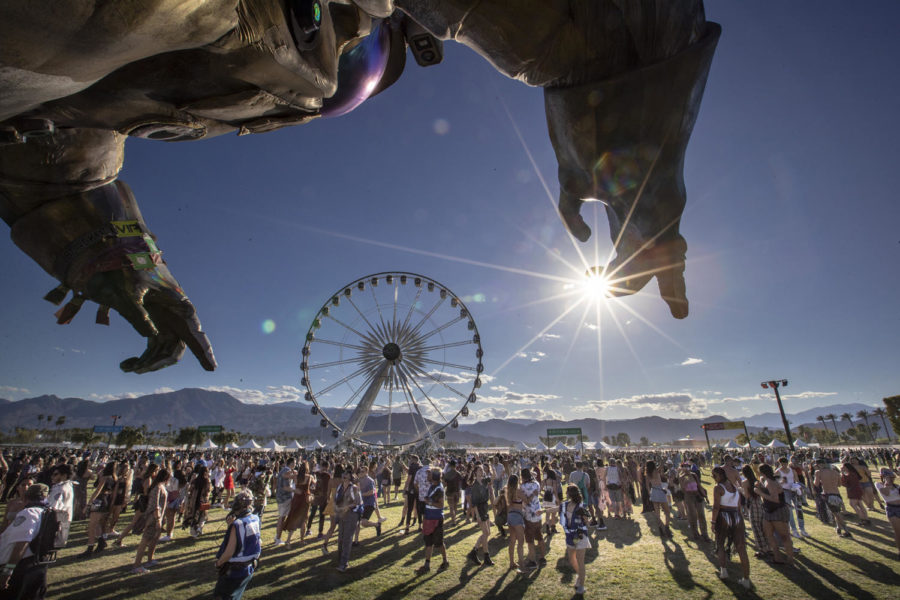Consumers Need to be Conscientious
The world-famous music festival highlights that Americans may not be watching their money is going.
PHOTO | TNS
A hand of “The Astronaut” looms over the festival grounds during opening day at the Coachella Valley Music and Arts Festival on the Empire Polo Club grounds in Indio, Calif., on Friday, April 12, 2019. (Brian van der Brug/Los Angeles Times/TNS)
From Chick-Fil-a and Coachella to all the fast fashion businesses dominating the market, a lack of conscientious consumerism is plaguing America. Many Americans either are unknowingly giving their money to organizations who support beliefs they may not believe in, or they don’t care.
Coachella’s owner, Philip Anschutz, has faced much backlash due to his donations to Republican party members and organizations with Republican beliefs. These include anti-abortion, pro-gun and even some anti-LGBTQ organizations, according to The Atlantic. While Anschutz recently said he revoked his donations to anti-LGBTQ groups and didn’t know he was donating to these organizations according to The Atlantic, his political ideologies are still very different than those of Coachella’s targeted audience.
Coachella is one of the most famous music festivals in America attracting over 125,000 fans annually over two weekends. With ticket prices at $500 and up, the Coachella owners, including Anschutz, had made millions. Coachella attracts many artists who are known for their political activism and democratic or liberal views points, in direct contrast the conservative, right-wing Anschutz. Liberal artists tend to attract liberal fans and with over half the attendees of Coachella being from California, a historically liberal and democratic state, directly supporting Anschutz doesn’t make sense.
The attendees either don’t know about who they are really giving their money to, or don’t care, worrying more about the perfect outfit and Instagram post than who they are giving their money to. That’s an issue. Conscientious consumerism is defined as someone who considers the social, environmental, ecological and political impact of their buying and boycott actions. If the liberal and democratic attendees of Coachella had wanted to make an impact on based on their beliefs, they shouldn’t be going to Coachella.
Conscientious consumerism applies to much more than just Coachella. Americans should be conscious in where their money is going to when buying everything – from buying groceries to clothing. People need to look up where the businesses that make their products are getting their labor from and where the money the businesses and business owners earn is going.
Chick-Fil-a has been battling the press for donating money to anti-LGBTQ organizations, including groups that promote conversion therapy, according to Vox. Many boycotts have been scheduled or talked about on social media by activists, but Chick-Fil-a is still in business and is doing well. By not sticking with boycotts or not caring about where Chick-Fil-a is donating, Americans are valuing chicken over LGBTQ rights.
A quick google search of the companies you are purchasing from can tell you how they make their products and who their owners are. Conscientious consumerism is not just a trend that has popped up lately in the media; it should become a lifestyle. Another example would be the fast fashion industry. Fast fashion is when inexpensive clothing is produced rapidly by mass-market retailers often at the expense of the workers making the clothing.

A rescuer carries an injured boy from the rubble of Rana Plaza on April 24, 2015 in Dhaka, Bangladesh. The eight-story commercial building collapsed, killing over a thousand people and thousands more injured. Authorities in Balgladesh charged 42 people with murder on Monday in the collapse, including the building’s owner. (Shariful Islam/Xinhua/Zuma Press/TNS)
Fast fashion businesses like H&M have been in the news for their poor treatment and non-living wages for their workers, many of whom are women and children. While fast fashion clothing brands tend to be less expensive, many brands have a poor impact on their workers lives, whether that be through sweatshop conditions or non-living wages. The Rana Plaza building collapse of 2013 killed over a thousand people working in the textile industry because the auditors missed many important issues that were wrong with the building, according to the Guardian. The owners valued the product at a cheap price over their workers’ safety and health.
Conscientious consumerism is about watching where goods are coming from and where the money the company is making is going. For a generation that has thousands of activist Instagram accounts, role models who take a stand like the March for Our Lives leaders and a passion for changing the world around them, why are they not doing the little things. Making a difference is easy by watching where the money goes, America needs to get on board. Americans need to realize that paying attention to where they shop is important, and no Coachella Instagram post is worth going against personal moral beliefs.



